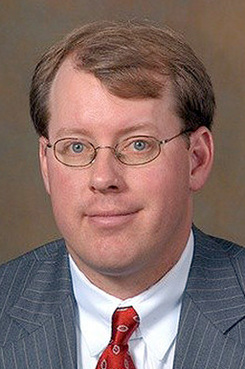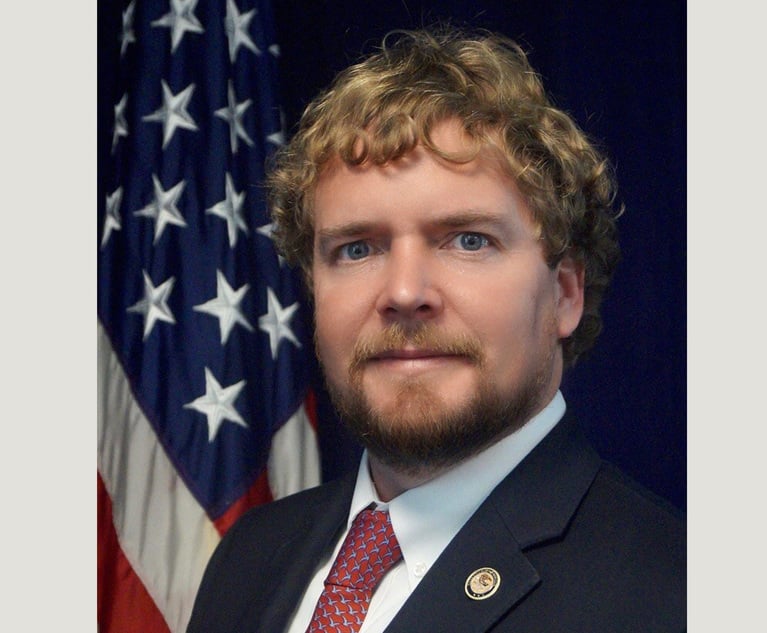'A Thief and a Liar': Jurors Hear Accusations, Accounting as Hardwick Trial Begins
In trying to prove that Nathan Hardwick embezzled millions of dollars from his firm, prosecutors will need to guide jurors through a welter of financial records and complex details.
September 25, 2018 at 10:44 AM
7 minute read
 Nathan Hardwick.
Nathan Hardwick.Courtroom 1708 in the Richard B. Russell Federal Building was packed for opening statements Monday in Atlanta lawyer Nathan Hardwick IV's embezzlement trial, which pitted federal prosecutor J. Russell Phillips against longtime Atlanta criminal defense attorney Ed Garland.
U.S. Attorney BJay Pak, was there, as was the former lead prosecutor for the case, David Chaiken, who almost two years ago became a partner in Troutman Sanders' white-collar practice.
Federal prosecutors indicted Hardwick, formerly the managing partner of now-defunct residential real estate and closing firm Morris Hardwick Schneider, in February 2016, alleging that he stole millions of dollars from client escrow accounts and spent almost $18 million on charter jets, casinos, bookies and women alone.
They indicted the firm's former controller, Asha Maurya, at the same time as a co-conspirator. Maurya pleaded guilty to a single count of conspiracy to commit wire fraud last year and is cooperating with the government.
Hardwick's defense team, led by Garland of Garland, Samuel & Loeb, has maintained since the escrow shortfalls became public in August 2014 that Maurya was the culprit, not Hardwick.
Over their hour apiece for opening statements, both sides struggled to clear a path through the welter of details about MHS's accounting records, shareholder agreements, bank records and emails between Hardwick and other parties to present a compelling narrative to the jury.
'Partner in Crime'
Phillips jumped right in without introducing himself and told the jury that the government would prove Hardwick is “a thief and a liar.”
Maurya, his alleged co-conspirator, “is also a thief and a liar,” Phillips added—but “there is not going to be any evidence” that Maurya lied to Hardwick about how much money the firm was making or that he was taking out more than its net income.
The government would present evidence, Phillips said, “that Hardwick and Maurya lied to his law partners about how much money he was taking out.”
“The defense is going to spend a lot of time talking about Asha Maurya's lying,” Phillips said. She's not “snow white,” he said. That's why Hardwick chose Maurya as his “partner in crime,” he added.
“When Mr. Garland gets up here, he's going to totally dump on Asha Maurya,” Phillips told the jury. “He's going to try to make the whole case about her.”
But, he added, “This is going to be a case about 'false statements' from Nathan Hardwick.”
According to Phillips, Hardwick was “deeply in debt” by the end of 2010, after a 2008 divorce that cost him $5.5 million and MHS's closing business dried up from the financial crisis.
Hardwick's “income was slashed” and his personal investments, much tied up in real estate, had “tanked,” Phillips said, adding that Hardwick also owed $2.2 million on a loan to buy out a former partner from a prior firm.
At beginning of 2011, “Nathan Hardwick was broke,” Phillips told the jury.
The firm's net income totalled about $10 million from 2011 to 2013, but Hardwick took $20 million in that time on top of his salary—and a total of $26 million by August 2014, Phillips told the jury. Hardwick spent more than $18 million on private jets, gambling and “social companions,” including more than $10 million on bookies and casinos and $186,000 to use a private island for a party, the prosecutor said.
Philips said the government would show that Hardwick “knew MHS was making much less than he was taking” and that his draws were coming from the firm's escrow accounts. The evidence, he said, includes the firm's accounting and bank records, shareholder agreements and emails from Hardwick to Maury and his law partners Mark and Gerard Wittstadt, who ran the foreclosure side from Baltimore.
Big Dreams
Garland told jurors the government's case was mistakenly based on the notion that “Mr. Hardwick had motive to steal from his own law firm that he owned 55 percent.”
“Mr. Harwick was deceived by Ms. Maurya. He didn't know she was a thief,” Garland said. “What a thief she was will astound you,” he added.
“Hardwick was not involved with the accounting,” Garland said, explaining that he was “a big-picture guy” who handled marketing, customer service and strategic planning. Hardwick assumed the money he was getting came from the firm's operating accounts, his lawyer added.
Garland said MHS's 2013 revenue was just under $73 million. With millions of dollars flowing through the firm, he added, Maurya “fooled the accountants.”
She was “stealing from the company,” Garland said, starting after she was hired in April 2009. The defense lawyer said Maurya stole at least $800,000, adding that “no one really knows how much.”
Garland told the jury that Hardwick had no motive to steal from his firm. “We don't run from the fact that he had debts, he had lavish spending,” he said. “We don't run from the fact that the money spent on gambling was personal.”
“Sure he was in debt,” Garland said, but the firm's revenue was increasing so he would be able to pay them. Hardwick also spent a lot on business expenses, his lawyer added. “And he did not know he had a crooked bookkeeper.”
“Nat Hardwick loved this law firm and the people in the firm,” Garland said.
Hardwick planned to take the firm public, Garland said, making his partners and employees rich through stock options. “When you have those kind of big dreams, you don't take money out of the escrow accounts.”
“The actions of Asha Maurya caused Nat Hardwick to unknowingly receive disbursements/transfers of funds. He did not take them with the intent to steal,” Garland concluded.
The jury spent the rest of the day hearing from the prosecution's first two witnesses—the lawyer who drew up MHS's shareholder agreements, Tommy Thompson Jr., who retired last year as a partner from Parker Hudson Rainer & Dobbs, and the accountant who led an audit of MHS's books for 2010-2012, John Shurley of Warren Averett. Phillips and Assistant U.S. Attorney Doug Gilfillan, respectively, handled the questioning.
After sitting through four hours of testimony on shareholder agreements and financial records, the jury's attention was clearly flagging by late in the day.
“This is a document-intensive trial and a long first day,” Judge Eleanor Ross of the U.S. District Court for the Northern District of Georgia told the jurors, advising them to rest up for Tuesday. “It's important for the case that you stay awake and remain alert.”
READ MORE:
Law Firm's Bankruptcy Looms Over Embezzlement Trial
Judge Delays Trial in Hardwick Law Firm Embezzlement Case
Jury Selected in Hardwick Trial
Embezzlement Trial Over Defunct Atlanta Firm Will Hinge on Intent
Hardwick Says He Was Rainmaker, Not Embezzler, at MHS
Morris Hardwick Schneider Accuses Founder of Embezzling $30M
This content has been archived. It is available through our partners, LexisNexis® and Bloomberg Law.
To view this content, please continue to their sites.
Not a Lexis Subscriber?
Subscribe Now
Not a Bloomberg Law Subscriber?
Subscribe Now
NOT FOR REPRINT
© 2025 ALM Global, LLC, All Rights Reserved. Request academic re-use from www.copyright.com. All other uses, submit a request to [email protected]. For more information visit Asset & Logo Licensing.
You Might Like
View All


Trending Stories
Who Got The Work
J. Brugh Lower of Gibbons has entered an appearance for industrial equipment supplier Devco Corporation in a pending trademark infringement lawsuit. The suit, accusing the defendant of selling knock-off Graco products, was filed Dec. 18 in New Jersey District Court by Rivkin Radler on behalf of Graco Inc. and Graco Minnesota. The case, assigned to U.S. District Judge Zahid N. Quraishi, is 3:24-cv-11294, Graco Inc. et al v. Devco Corporation.
Who Got The Work
Rebecca Maller-Stein and Kent A. Yalowitz of Arnold & Porter Kaye Scholer have entered their appearances for Hanaco Venture Capital and its executives, Lior Prosor and David Frankel, in a pending securities lawsuit. The action, filed on Dec. 24 in New York Southern District Court by Zell, Aron & Co. on behalf of Goldeneye Advisors, accuses the defendants of negligently and fraudulently managing the plaintiff's $1 million investment. The case, assigned to U.S. District Judge Vernon S. Broderick, is 1:24-cv-09918, Goldeneye Advisors, LLC v. Hanaco Venture Capital, Ltd. et al.
Who Got The Work
Attorneys from A&O Shearman has stepped in as defense counsel for Toronto-Dominion Bank and other defendants in a pending securities class action. The suit, filed Dec. 11 in New York Southern District Court by Bleichmar Fonti & Auld, accuses the defendants of concealing the bank's 'pervasive' deficiencies in regards to its compliance with the Bank Secrecy Act and the quality of its anti-money laundering controls. The case, assigned to U.S. District Judge Arun Subramanian, is 1:24-cv-09445, Gonzalez v. The Toronto-Dominion Bank et al.
Who Got The Work
Crown Castle International, a Pennsylvania company providing shared communications infrastructure, has turned to Luke D. Wolf of Gordon Rees Scully Mansukhani to fend off a pending breach-of-contract lawsuit. The court action, filed Nov. 25 in Michigan Eastern District Court by Hooper Hathaway PC on behalf of The Town Residences LLC, accuses Crown Castle of failing to transfer approximately $30,000 in utility payments from T-Mobile in breach of a roof-top lease and assignment agreement. The case, assigned to U.S. District Judge Susan K. Declercq, is 2:24-cv-13131, The Town Residences LLC v. T-Mobile US, Inc. et al.
Who Got The Work
Wilfred P. Coronato and Daniel M. Schwartz of McCarter & English have stepped in as defense counsel to Electrolux Home Products Inc. in a pending product liability lawsuit. The court action, filed Nov. 26 in New York Eastern District Court by Poulos Lopiccolo PC and Nagel Rice LLP on behalf of David Stern, alleges that the defendant's refrigerators’ drawers and shelving repeatedly break and fall apart within months after purchase. The case, assigned to U.S. District Judge Joan M. Azrack, is 2:24-cv-08204, Stern v. Electrolux Home Products, Inc.
Featured Firms
Law Offices of Gary Martin Hays & Associates, P.C.
(470) 294-1674
Law Offices of Mark E. Salomone
(857) 444-6468
Smith & Hassler
(713) 739-1250







